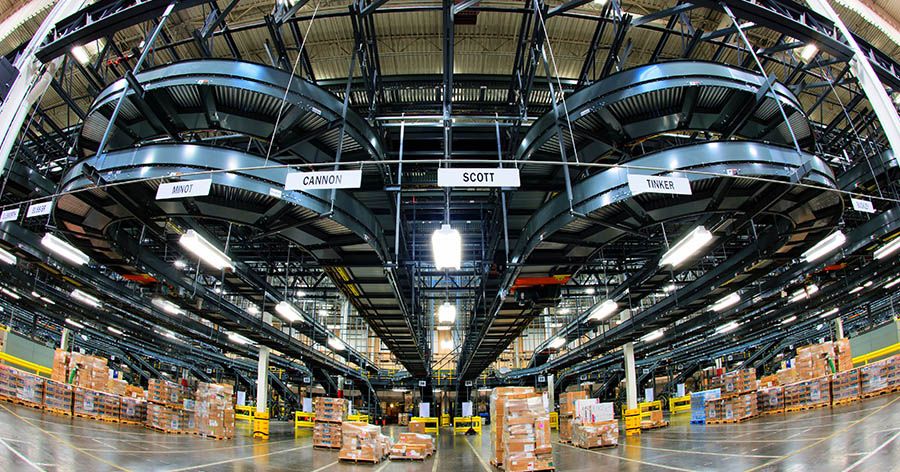
Companies ‘determined to improve warehouse automation’, says Honeywell survey
Companies are “determined to improve warehouse automation”, according to new research by Honeywell Intelligrated.
The survey reveals “improving automation processes” is the most common near-term goal for e-commerce, logistics and food and beverage companies.
Despite the current pandemic, businesses have a positive outlook on growth and will be relying on warehouse automation processes to maintain that optimism, according to a recent Honeywell.
The 2020 Honeywell Intelligrated Automation Study revealed improving automation processes is the most common top-ranked goal for supply chain managers in the next one to two years.
When given a list of possible goals, 14 percent of companies rank improving automation within their facilities as their top priority, and 37 percent of companies rank it in their top three goals for the near term.
Despite the importance of improving automation processes, just 43 percent of companies with automation in their top strategic goals say they are very prepared to achieve it, the study reveals.
Christine Feuell, CMO of Honeywell Intelligrated, says: “Distribution and fulfillment operations often struggle with how to plan and execute the transitions to automation.
“The Covid pandemic has accelerated conversations around defining the right technology and solution strategy and deployment plans for their respective business.
“For example, the e-commerce industry has experienced rapid global growth from users of all generations due to stay-at-home mandates and social distancing requirements, and more consumers are adapting their shopping behaviors as they see the convenience it provides.
“These shifts in how consumers buy and take delivery of their orders influence the type of automation and fulfillment strategies companies will require to help achieve the customer service levels that customers expect.”
According to the National Retail Foundation, nearly half of baby boomers say they’re shopping online more as a result of the pandemic, which is significant given the vast majority typically make less than half of their purchases online.
Of supply chain managers who have piloted an automation solution, the results have been overwhelmingly positive, according to the study. More than 85 percent say the solution has led to positive business outcomes for the company, and half say the positive outcomes are significant.
Cost of implementation is the main reason for hesitance of investment in automation, with nearly half of companies polled mention it as a major barrier to automation adoption, according to the study.
The consumer packaged goods industry leads the pack, as 55 percent of respondents in the group say cost of implementation is the biggest barrier to adoption.
One in three polled mention the difficulty or complexity of implementation as a barrier to automation adoption, the study reveals.
As an example, nine in 10 companies see positive outcomes using automated storage and retrieval solutions (AS/RS) technology, a widely used automation solution across industries, however eight in 10 mentioned implementation was a challenge.
As fast delivery continues to become table stakes in various industries, companies are creating micro-fulfillment centers in or near city centers to be able to maintain high levels of customer service.
AS/RS shuttle technology helps move higher volumes of product and make the best use of valuable storage space.
While this automation technology has been proven to maximize efficiency and productivity in multiple industries, there is a major time and training investment involved. Installation, labor training and integration into other software systems can take anywhere from 12 to 24 months.
Feuell says: “Companies need to understand that installing new automation technologies is not plug-and-play, and these solutions need to be integrated into their software and control systems to ensure they enhance operational performance.
“We’ve consulted and supported many companies with their automation transformations and lay out detailed implementation schedules to have them understand the time and effort it takes to maximize productivity and to promote a safe and healthy distribution center.”
From concept and integration to industry-leading lifecycle support services, Honeywell Intelligrated draws on its expanding portfolio and deep industry expertise to help the warehousing, distribution and fulfillment companies optimize and manage their processes.
The business offers integrated end-to-end automation solutions, voice-guided software, warehouse execution systems and analytics solutions to improve throughput and keep workers safe. For more information, visit intelligrated.com.
The 2020 Honeywell Intelligrated Automation Investment Study was conducted April 21 to May 7, 2020 in collaboration with KRC Research, an independent third-party research firm not affiliated with Honeywell or its business groups.
The 434 US-based professionals polled work full-time in senior roles for companies that directly manage warehouses, distribution centers or fulfillment centers; have insight into the operations of those facilities; are familiar with automation; and make or influence purchase decisions for their company.


